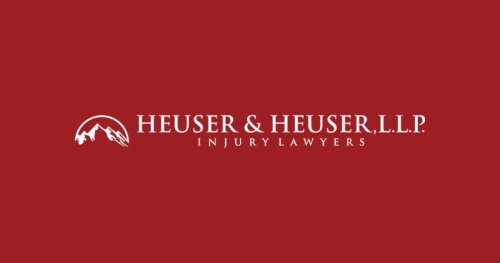Best Toxic Mold Lawyers in Pueblo
Share your needs with us, get contacted by law firms.
Free. Takes 2 min.
List of the best lawyers in Pueblo, United States
1. About Toxic Mold Law in Pueblo, United States
Toxic mold issues in Pueblo, Colorado are governed by state and local housing, health, and consumer protection frameworks rather than a dedicated nationwide mold statute. In practice, mold disputes arise from habitability obligations, property disclosures, building maintenance, and remediation costs. City and county housing codes, along with state health standards, shape how mold problems are investigated and resolved.
Residents of Pueblo typically rely on a combination of Colorado state law and local Pueblo regulations to pursue relief. State level rules cover landlord-tenant duties and consumer protections, while local authorities may enforce housing codes and health inspections. When mold exposure affects health or financial losses, legal options may include civil claims, contract remedies, or enforcement actions by public agencies.
For Pueblo residents, understanding the roles of landlords, tenants, builders, insurers, and contractors is essential. A lawyer can help identify whether a mold problem constitutes a breach of warranty, a misrepresentation in a real estate transaction, or a failure to maintain a habitable dwelling. This guide provides Pueblo-specific context, practical steps, and credible resources to evaluate your options.
2. Why You May Need a Lawyer
Below are concrete, Pueblo-relevant scenarios where consulting a toxic mold attorney can be essential. Each example reflects real-world dynamics in Pueblo housing and property issues.
- A renter discovers persistent mold after a recurring leak, and the landlord refuses to remediate promptly. You may need counsel to compel repair timelines and document habitability breaches that affect health.
- You bought a home in Pueblo and later find hidden mold after closing. An attorney can evaluate disclosure gaps, potential rescission or price adjustment claims, and remediation recovery from sellers or contractors.
- Your insurer denies mold remediation costs or limits coverage despite documented water intrusion. A legal professional can assess coverage disputes, policy interpretation, and, if needed, pursue a claim under Colorado consumer protection or contract law.
- A Pueblo condo or HOA unit experiences mold as a result of building-wide moisture problems. You may require guidance on association duties, remediation plans, and equitable cost allocations among residents.
- You suspect mold exposure contributed to medical issues and are considering a personal injury or product liability claim. A lawyer can help evaluate causation, damages, and admissible evidence from local doctors and inspectors.
- Construction defects or contractor mistakes lead to mold growth during a remodel. Legal counsel can pursue defect claims, warranty remedies, and contractor liability under Colorado law.
In Pueblo, timelines matter: prompt legal advice can preserve evidence, enable timely inspections, and prevent one side from shifting liability. An attorney can also connect you with Pueblo-area experts for mold testing, remediation, and record keeping necessary for any claim.
3. Local Laws Overview
Pueblo relies on a mix of Colorado state statutes, building and housing regulations, and local ordinances. While there is not a single mold-specific statute unique to Pueblo, a few recognized frameworks guide how mold related issues are addressed in this jurisdiction.
The following sources provide authoritative context for Pueblo residents handling mold related matters:
- Colorado Consumer Protection Act (CCPA) - This state statute prohibits unfair or deceptive acts or practices in the conduct of any trade or commerce, including misrepresentations about property conditions or mold remediation services. This act is widely used to pursue misrepresentations in housing disclosures and service contracts. Corporate and individual violators may face civil penalties and damages.
- Uniform Residential Landlord and Tenant Act (URLTA) as applicable in Colorado - This model framework informs landlord-tenant rights and responsibilities for habitable housing, including duties to maintain the premises in a safe condition. Local Pueblo adoption and implementation may vary, so check the City of Pueblo code for exact applicability.
- Implied Warranty of Habitability (Colorado common law) - Colorado recognizes a tenant’s implied warranty that a rental property will be fit for ordinary residential purposes and free from conditions that render it uninhabitable. When mold significantly impairs health or safety, this doctrine can support tenant claims even absent a written warranty.
Key Pueblo resources to verify current requirements include the City of Pueblo and Pueblo County public health and building departments, along with state level guidance. Public health and housing codes enacted in Pueblo determine inspection, abatement, and remediation processes for mold related hazards.
“Mold growth in rental housing can create both health risks and legal liability for landlords who fail to address moisture problems promptly.” - Colorado Department of Public Health and Environment guidance
Authoritative sources for mold and housing law in Colorado include federal and state agencies. The U.S. Environmental Protection Agency provides general mold remediation guidance, while the U.S. Department of Housing and Urban Development offers resources on safe and habitable housing. For Pueblo specific enforcement and inspection practices, consult the City of Pueblo official pages and Pueblo County Public Health.
Useful official references:
- U.S. Environmental Protection Agency on mold remediation and health effects: https://www.epa.gov/mold
- Colorado Department of Public Health and Environment mold information: https://cdphe.colorado.gov/mold
- U.S. Department of Housing and Urban Development on healthy housing and mold issues: https://www.hud.gov/program_offices/healthy_housing
4. Frequently Asked Questions
What is considered toxic mold?
Toxic mold refers to certain species that produce mycotoxins, such as some Stachybotrys or Aspergillus varieties. Health risks depend on exposure duration and individual susceptibility. For homeowners and tenants, mold presence alone is not automatically a ruling in law; context matters for liability and remedies.
How do I prove mold is harming my health in Pueblo?
Documentation matters: medical records, doctor notes linking symptoms to mold exposure, and testing results help establish causation. A professional mold inspection report and moisture-risk assessments support your claim.
What should I do first if I find mold in a rental property in Pueblo?
Notify the landlord in writing, document dates and conditions, and request timely remediation. If the response is insufficient, consider a formal inspection by a licensed inspector and consult an attorney about remedies.
Do I need a lawyer to handle mold issues in Pueblo?
Not always, but a lawyer can help with complex disputes, expensive remediation, or health-related claims. A lawyer can also help preserve evidence and navigate local housing codes and remedies.
How much can mold related legal help cost in Pueblo?
Costs vary by case complexity and region. Initial consultations may be free or low-cost with many Pueblo attorneys. If pursuing a lawsuit, be prepared for potential fee arrangements such as contingency or hourly fees.
Can a landlord sue me for mold damages I caused?
Yes, a landlord may seek damages for mold caused by tenant negligence, but you may have defenses if the mold resulted from structural issues or landlord failure to repair essential moisture problems.
Should I file a public health complaint in Pueblo?
If there is an ongoing health risk or immediate danger from mold, you can contact local health authorities. Public health actions can prompt inspections and remediation orders when needed.
Do I need mold testing before negotiating with a landlord or seller?
Independent mold testing can provide objective data for negotiation. However, test results should be interpreted by a qualified environmental professional to avoid misinterpretation in a dispute.
Is mold remediation covered by homeowners or renter’s insurance in Pueblo?
Coverage depends on the policy. Some policies cover remediation after a specified covered loss, while others may exclude mold unless caused by a covered peril. Review your policy and discuss with your insurer.
How long do mold-related disputes typically take in Pueblo?
Timeline varies by case type. Tenant-landlord disputes can resolve in weeks to months. Filed lawsuits may take several months to a year or more, depending on court calendars and discovery.
What counts as a legitimate mold dispute in real estate transactions?
Undisclosed mold, misrepresented conditions, or failure to disclose known moisture problems can form the basis of a dispute. Legal remedies range from rescission to damages and remediation costs.
Can I sue a contractor or builder for mold problems after a remodel?
Yes, if mold results from construction defects, improper waterproofing, or substandard workmanship. A lawyer can pursue contract remedies, warranty claims, or defect claims against responsible parties.
5. Additional Resources
These official resources provide guidance on mold, housing quality, and occupancy safety. They are useful for Pueblo residents seeking factual information and formal procedures.
- U.S. Environmental Protection Agency (EPA) - Mold provides general health effects information and cleaning guidelines for households. Link: https://www.epa.gov/mold
- Colorado Department of Public Health and Environment (CDPHE) - Mold offers state-level information on mold hazards and environmental health guidance relevant to residences and workplaces. Link: https://cdphe.colorado.gov/mold
- U.S. Department of Housing and Urban Development (HUD) - Healthy Housing resources address safe and healthy homes, including mold considerations in housing. Link: https://www.hud.gov/program_offices/healthy_housing
6. Next Steps
- Document the mold problem in detail. Take dated photos, note moisture sources, and keep all communication with the landlord or seller in writing.
- Obtain a licensed environmental mold inspector to assess moisture sources, mold type, and remediation scope. Request a written report for your records.
- Review your Pueblo housing documents and city code. Confirm whether the property is in compliance with local housing standards and any city health orders.
- Consult a Pueblo attorney who handles housing and mold disputes. Bring all documents, testing reports, medical records, and insurance information to the initial consultation.
- Request timely repairs or remediation through written notices per Pueblo requirements. Seek emergency orders if health is at immediate risk.
- Consider settlement options first, such as a credit, remediation plan, or rent adjustments. If negotiations fail, evaluate small claims or civil action options with your attorney.
- Take note of important deadlines and statute-based limits for filings, and follow your attorney’s guidance for preserving evidence and ensuring proper service of papers.
Lawzana helps you find the best lawyers and law firms in Pueblo through a curated and pre-screened list of qualified legal professionals. Our platform offers rankings and detailed profiles of attorneys and law firms, allowing you to compare based on practice areas, including Toxic Mold, experience, and client feedback.
Each profile includes a description of the firm's areas of practice, client reviews, team members and partners, year of establishment, spoken languages, office locations, contact information, social media presence, and any published articles or resources. Most firms on our platform speak English and are experienced in both local and international legal matters.
Get a quote from top-rated law firms in Pueblo, United States — quickly, securely, and without unnecessary hassle.
Disclaimer:
The information provided on this page is for general informational purposes only and does not constitute legal advice. While we strive to ensure the accuracy and relevance of the content, legal information may change over time, and interpretations of the law can vary. You should always consult with a qualified legal professional for advice specific to your situation.
We disclaim all liability for actions taken or not taken based on the content of this page. If you believe any information is incorrect or outdated, please contact us, and we will review and update it where appropriate.









